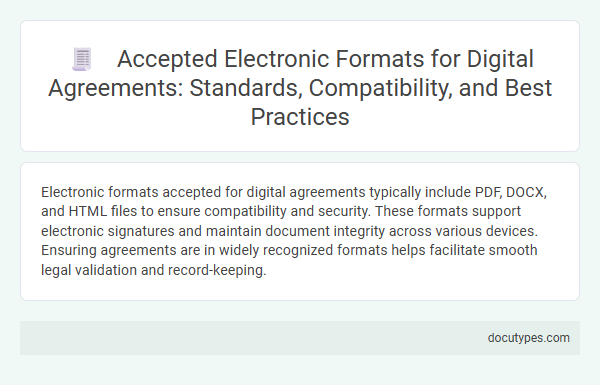Electronic formats accepted for digital agreements typically include PDF, DOCX, and HTML files to ensure compatibility and security. These formats support electronic signatures and maintain document integrity across various devices. Ensuring agreements are in widely recognized formats helps facilitate smooth legal validation and record-keeping.
Introduction to Accepted Electronic Formats for Agreements
Digital agreements require specific electronic formats to ensure legal validity and seamless processing. Commonly accepted formats include PDF, DOCX, and electronic signature standards like PAdES and XAdES. These formats provide security, authenticity, and compatibility across various platforms and devices.
Common Standards for Digital Document Formats
Electronic agreements require specific digital formats to ensure compatibility and legal validity. Common standards enhance document accessibility and security across platforms.
- PDF (Portable Document Format) - Widely accepted for its fixed layout and compatibility with electronic signatures.
- DOCX (Microsoft Word Document) - Supports editable content while maintaining formatting for review and approval.
- XML (Extensible Markup Language) - Used for structured data exchange facilitating automated processing of agreements.
PDF: The Ubiquitous Format for Legal Agreements
Digital agreements require specific electronic formats to ensure legal validity and ease of access. PDF stands out as the most widely accepted format due to its reliability and security features.
- Universality - PDF files are compatible across all devices and operating systems, making them ideal for legal documents.
- Security - PDFs support encryption, digital signatures, and watermarking, which protect the integrity of agreements.
- Preservation - The format maintains consistent layout and content over time, crucial for legal record-keeping and compliance.
Word Documents and Editable Agreement Formats
What electronic formats are accepted for digital agreements? Word documents are widely accepted due to their compatibility and ease of editing. Editable agreement formats ensure that you can customize terms directly within the document, streamlining the agreement process.
E-Signature Compatibility Across File Types
Electronic agreements commonly accept formats such as PDF, DOCX, and HTML for seamless e-signature integration. These file types maintain document integrity and support various digital signature platforms.
You should ensure your agreement files are compatible with e-signature software like DocuSign, Adobe Sign, or HelloSign. Compatibility across these formats guarantees secure, legally binding digital signatures without format conversion issues.
Security and Compliance in Electronic Agreements
| Accepted Electronic Formats for Digital Agreements | Security and Compliance Features |
|---|---|
| PDF (Portable Document Format) | Encrypted signatures and document protection ensure data integrity and prevent unauthorized alterations. |
| DOCX (Microsoft Word Document) | Supports digital signatures compliant with eIDAS and UETA standards, enabling legally binding agreements. |
| HTML (HyperText Markup Language) | Allows embedded digital signatures using Public Key Infrastructure (PKI) for enhanced security and traceability. |
| XML (eXtensible Markup Language) | Structured data format compatible with XML Signature standards, offering verification and authentication features. |
| Electronic Signature Platforms (e.g., DocuSign, Adobe Sign) | Use multi-factor authentication, audit trails, and tamper-evident seals to comply with international electronic signature laws. |
Cross-Platform Accessibility Considerations
Accepted electronic formats for digital agreements include PDF, DOCX, and HTML, ensuring compatibility across various devices. These formats support electronic signatures and preserve document integrity during transmission.
Cross-platform accessibility is crucial when choosing a format to ensure your agreement can be opened and signed on different operating systems like Windows, macOS, iOS, and Android. PDF is widely preferred for its consistent formatting and security features across platforms. Choosing widely supported formats guarantees smooth user experience and legal compliance in digital agreements.
File Integrity and Version Control Best Practices
Accepted electronic formats for digital agreements typically include PDF, DOCX, and sometimes specialized formats like XML for structured data. These formats ensure the content remains consistent and accessible across different devices and platforms.
Maintaining file integrity involves using secure hashing algorithms to verify that the document has not been altered after signing. Version control best practices recommend storing each revision with timestamps and detailed metadata to track changes effectively.
Emerging Technologies in Digital Agreement Formats
Emerging technologies are redefining the electronic formats accepted for digital agreements, enhancing security and accessibility. These advancements support a wider range of formats beyond traditional PDFs and DOCs, integrating cutting-edge digital transaction methods.
- Blockchain-based formats - Utilize decentralized ledgers to ensure immutability and verify consent in digital agreements.
- Smart contracts - Enable automated execution and enforcement of agreement terms through programmable code.
- Biometric authentication formats - Incorporate fingerprint, facial recognition, or voice verification to validate signatories securely.
Adopting these innovative electronic formats helps organizations create legally binding digital agreements with improved trust and efficiency.
What Electronic Formats Are Accepted for Digital Agreements? Infographic

